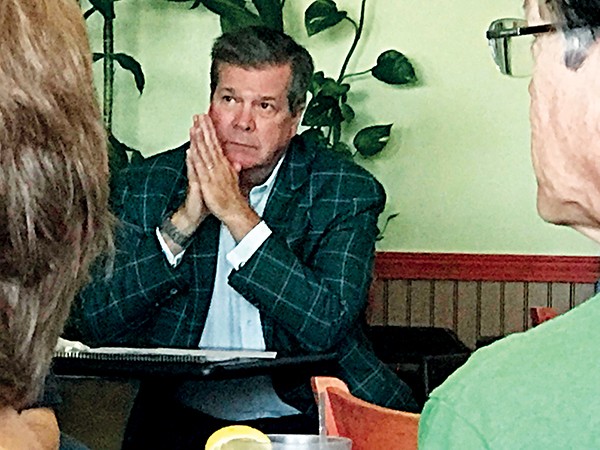It is still 2017, which means that candidates for election in 2018 see their task as introducing themselves to the electorate and, when gathered together on the same stage with their declared primary opponents, are still making nice with each other, more or less.
Such was the case this past Friday night at a gubernatorial forum arranged for GOP hopefuls during the annual convention of the Tennessee Federation of Republican Women, a weekend affair held at the University of Memphis Holiday Inn.
There are six declared Republican candidates to date, and they all sat together in a row on stage, ready to be evaluated by several hundred women from Republican clubs across the state. Although a few of them may have appeared together on ad hoc occasions before, this was evidently one of the first times they were all assembled en masse, and the semiotics of the affair were such as to put them all — four women and two men — on an artificially equal footing.
In fact, three of the female candidates — 6th District Congressman (she prefers the term) Diane Black, state Senator Mae Beavers, and state House Speaker Beth Harwell — all wore nearly identical shades of red. The fourth, Kay White, a Johnson City activist, wore a dun-colored outfit, and that shade of difference, no doubt a happenstance, happened to coincide with her status as an outlier of sorts, with nothing like the name recognition or advance ballyhoo of the others.
The two men — former state Commissioner of Economic Development Randy Boyd and Franklin businessman/farmer Bill Lee — both wore standard blue jackets, though Boyd’s belonged to a suit and Lee’s to an informal outfit that included khaki pants and an open-collared shirt.
 Jackson Baker
Jackson Baker
Karl Dean waits turn to speak at a Democratic meeting
Here, too, in a way, medium was message: Boyd, the earliest declared candidate, looked like what he was, a key member of Governor Bill Haslam‘s state government, the deviser of Tennessee Promise, Drive to 55, and numerous other Haslam initiatives. Lee, by contrast, sported a folksier look consistent with his professed persona as a non-politician type, a Cincinnatus ready to put down his plow and come to the aid of the commonwealth.
Interestingly, both men are doing idiosyncratic turns on a venerable Tennessee tradition — the solitary cross-Tennessee trek, whereby a candidate goes from place to place, starting at one end of the state, usually East Tennessee, meeting and greeting all the way, and ends up with a ceremonial final splash in Memphis. That was the literal finale for then-gubernatorial candidate Lamar Alexander in 1978, who walked his way across Tennessee in a plaid shirt and took a tentative dip in the Mississippi River at the very end.
Lee, in fact, had formally arrived in town only the previous day, via tractor (though he is basically a cattle farmer), concluding a “95-Counties-in-95-Days” pilgrimage begun in Mountain City on the North Carolina border. He got here in time for a Thursday night riverboat ride sponsored for the GOP rank-and-file by the Shelby County Republican Party, then met up with some local folks in Millington on Friday at a pizza cafe.
Boyd, who has been in Memphis a multitude of times already, is theoretically still on his way here. A veteran marathoner, he is about mid-way on a run across the state, doing eight miles a day and then holing up in this or that township, making a point of greeting as many local folks as he can before moving on. He went back to his route after Saturday’s forum, though he is liable to be in town a few more times for fund-raisers and such before he technically concludes his trip.
At this stage, the differences between candidates on issues can largely be divined by reading between the lines. On Friday night, all were professed conservatives (as, indeed, all Republicans describe themselves, even the few bona fide moderates in today’s right-tilting GOP), all are four-square for traditional values, all are budget hawks, all want government to create a climate propitious for business.
The most zealous partisans seemed to be Black, who began her political career as a state legislator opposed to TennCare; Beavers, a self-styled “Christian constitutional conservative” with low tolerance for taxes or diversity on social issues, and White, a veteran Tea Partier and former Trump campaign official (who, paradoxically, had kind words for Democratic icons JFK and Harry Truman).
The closest thing to a one-on-one clash was Black’s questioning of optimistic Tennessee employment figures immediately after Boyd had enumerated them, though she did not call him out by name.
The forum was what cynics might call a dog-and-pony show, in that there was more show than substance, though there were ample opportunities for seasoned members of the audience to let their imaginations do some divining.
The GOP gubernatorial primary will be a hard-fought affair, with several of the candidates able to boast both personal wealth and significant financial support, and the eventual nominee will no doubt win by a plurality, probably a narrow one. In such circumstances, major disagreements are inevitable, and the polite relations of Friday night almost certainly will be just a memory.
• Meanwhile, former Nashville Mayor Karl Dean, one of two declared Democratic candidates for governor (the other is state House minority leader Craig Fitzhugh of Ripley) turned up at a well-attended district meeting of the Shelby County Democratic Party in Collierville, touting three issues in a brief speech: education, jobs, and health care.
Unlike the Republicans, who tended to talk up their opposition to Common Core, Dean emphasized a need to raise teachers’ salaries. And he won tumultuous applause with a promise to pursue Medicaid expansion, something no GOP candidate is likely to entertain.